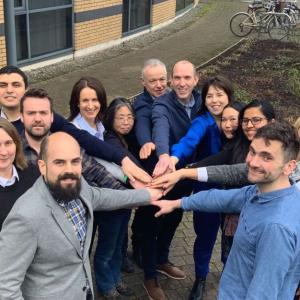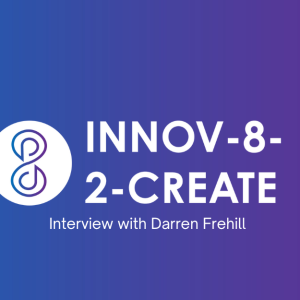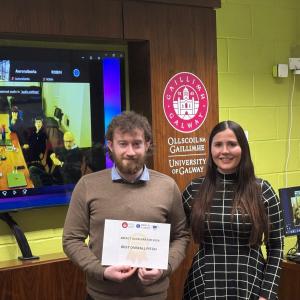Prior to setting up this collaborative international project, the Innovation Office’s Impact Series trainings were held at the University of Galway, Ireland. Those inspired a further development of the Horizon2020 funded EU endeavour.
In a conversation with the project coordinator and initiator, Kieran Ryan, we asked what inspired the first sessions and how they grew into an international EU-funded project.
Read on, to find out how the project was born and what some takeaways were from the I82C ‘demo’.
What inspired you to start the original project at the University of Galway, and could you share some details about that programme?
As you know the project is about innovation training for researchers. The original idea started because we regularly get people, or groups of people, that come to us and say they would like to get training to accelerate innovation. They wanted to get training in how to start a company, and after getting asked about this periodically, we'd end up giving the same training again and again, multiple times over the years.
And we said, OK, this isn't really sustainable.
At that stage we sat down and figured that if we're going to provide training, we need to make sure we're giving the right training to the right people. We developed the ‘researcher innovation readiness’ scoring chart. At the at the bottom of the scale, innovation level 0, there would be a newcomer to research who has no idea where to start or what innovation means. At the top of the scale, level 9, you've got someone who maybe has started a company or they've built something that's for sale on the market. There is a big difference between these two types of people, we needed to devise different levels of training to suit those differences. We came up with the idea that we need 3 levels of training: Tier 1, Tier 2 and Tier 3 and we decided to brand that as the Impact Series.
Tier one, the Impact Accelerator is what we're currently rolling out in I82C until wintertime. Then comes the ‘middle’ section training, for people who have an idea and have done some validation work, but now they need to come up with it with the next steps.
And that's where this all started!
Super, thank you! Can you tell me who the first actors and stakeholders involved in the original project were?
Our training was specifically for researchers at the University of Galway, as the Innovation Office, we wanted to support researchers but did not have all the answers ourselves, so we were very clear from the start, external stakeholders were needed for input. And I think that's an exciting part of I82C as well. We have, for example, funders, local government agencies, companies, consultants. Uh, we have all of these people contributing towards the knowledge exchange. The idea is that there are different experts delivering different parts of the series modules. With I82C it's more complicated because we have three countries involved as well, it is quite a complex set of stakeholders.
How did the original project at the University of Galway roll out and what were the outcomes or tangible effects of the project?
We ran the tier 1 training spring last year and the tier 2 training later in the year. The first part is information dissemination and trying to stimulate people and inspire people to think about how they can do innovation in their projects. The tier 2 training, the Impact Accelerator is more about working with individuals one on one to see how we can help with their projects. From last year's group we have about 3 or 4 projects that are in the process of applying for commercialization funding to bring their idea forward.
What are some experiences, positive or negative points, that you remember from the Innovation Office training? Something going wrong, something going better than you expected any outcomes that were surprising to you personally.
From the very start we wanted this project to be open to all disciplines. Normally, when people think of innovation, they think of technology, science, engineering and all these sorts of things. We want to make sure that this accelerator programme was accessible to everybody. We don't care if your background is in poetry, history, geography or any other discipline.
We were happy that the Impact Series attracted a number of researchers from the College of Arts, Social Science and Celtic studies in our university.
The practicalities of that can get difficult: when you're trying to deliver content, some of irrelevant for some people and irrelevant for other people. It's a challenge trying to get that alliance and a lot of the trainers that we brought in were very focused on science and engineering and the STEM side of thigs. We had to pull them back a little bit as we were conscious not to make people uncomfortable and feel like they don’t belong in these trainings. I think we did a reasonable job.
I'm also trying to think what kind of innovations in arts there can be, it might be encouraging to have a concrete example or see a project in this field succeed, have you witnessed any such stories?
Yes, there are definitely a few examples! A woman called Saintuya Dashdondog from Mongolia conducted research around early childhood obesity and similar issues. She wants to roll out a training program which incorporates themes such as healthy eating, cooking and exercise for kids between the ages of 4 and 8. The challenge is now she needs some funding to develop the program. This can be an example of a social enterprise, a self-sustainable non-profit organisation.
We had two other projects in the Faculty of Arts which were both in the field psychology and both concern using technology to support psychologists in delivering services to users. One of the projects is reliant on VR technologies for therapy. It was funded by the European Research Council, about halfway through the program. That was great because the researcher could keep working with his own fund and did not need us anymore, but we are still keeping a close eye on him to see the endeavour develop.
The other project is about using games and technology to help kids who have communication difficulties to portray their problems through a game. The way in which they interact with the game lets the parent or the healthcare professional see how the child is feeling, even though they might not be able to communicate that clearly.
Those projects sound very interesting! What inspired you in the Innovation Series project to bring it to a larger scale and initiate I82C?
It’s very it's very interesting how people build up networks. A couple of years ago, Chiara Ricca, from the University of Turin came to us for a week on an Erasmus placement. She had just started her job and I suppose she wanted to visit somewhere else, to upscale and learn from a different example, perspective. After she stayed here, we got on very well and stayed in contact, and immediately got in touch with her before writing the I82C proposal. We needed the third partner and we worked with the University of Riga before on another project and figured they would fit perfectly.
We started to put the project proposal together, then invited ASTP to get involved. Again, it was building on existing relationships and networks that we had on the through Erasmus. So thank you, Europe.
I have one last question which is: what do you hope comes out of INNOV-8-2-CREATE, what do you what the participating parties but also a wider public and maybe potential future partners to gain from the project?
From the participating universities’ perspective, I think we are hoping to increase researchers’ innovation readiness level. If the ‘innovation scale’ average in our universities is 2, by the end of this program, we want it to be 4. It's about upskilling everybody and putting into place all the great research we’ve conducted.
How can we support researchers and bring their ideas to live, to create new products and services that can improve society?
And that's really the bottom line I think, for all of us.
There's all this great research: how do we stop it from sitting on a shelf in somebody's office, how do we get it out there to benefit everybody?
It is a big challenge and the people that we need to target are mostly younger researchers, ones who are energetic and enthusiastic, excited and ready to try different things.
If you wish to learn more about the I82C project, follow our social media and website!




